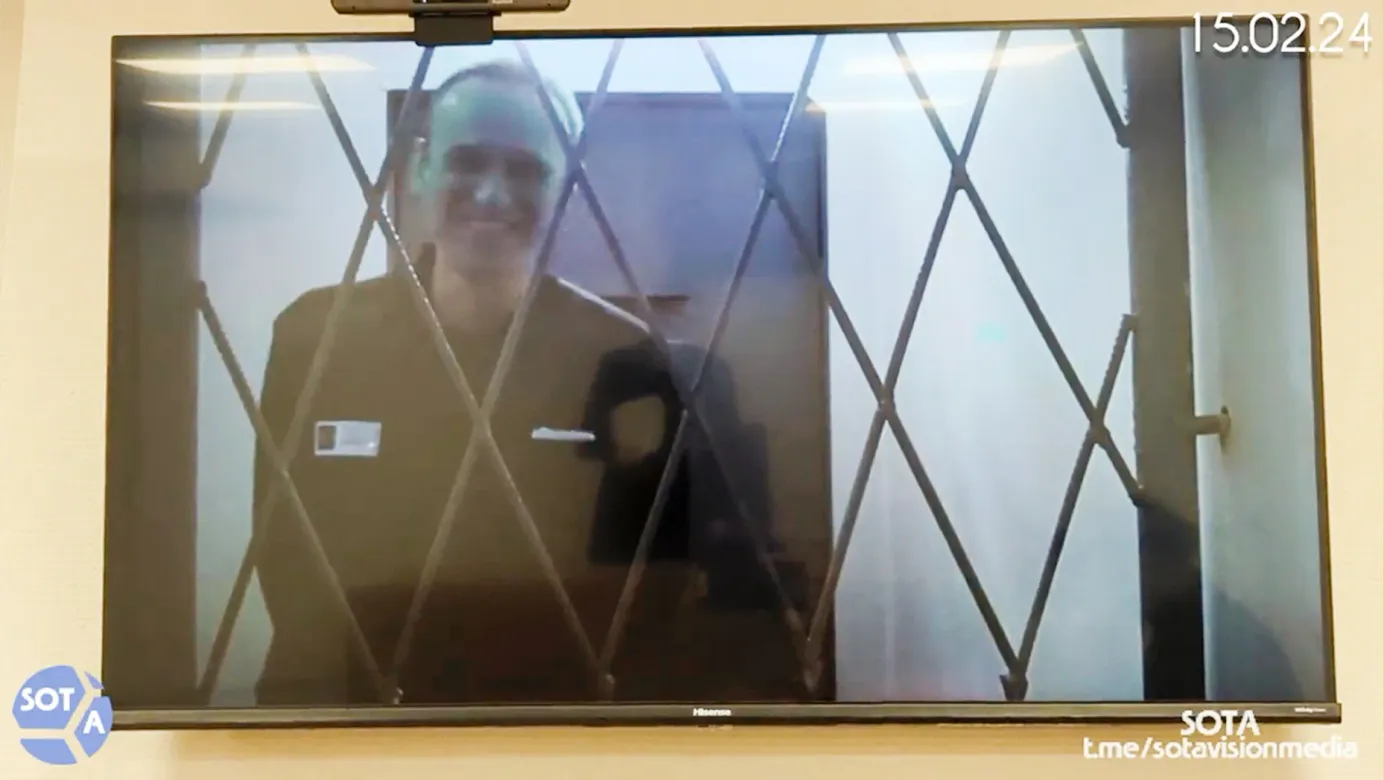
THE BELL WEEKLY: Navalny’s body released
Hello! This week we look at the unsavoury battle to secure the release of Alexei Navanly’s body. We also cover an escalation in raids against the LGBT+ community and how Moscow largely ignored the second anniversary of its invasion of Ukraine.
Alexei Navalny’s body handed over after public outcry
While opposition leader Alexei Navalny was alive, the authorities took every opportunity to make his life as difficult as possible. This persecution continued even after his death. Only at the last moment and after a series of public arguments and interventions did investigators hand Navalny's body over to his mother. Even then they tried to insist — illegally — that his funeral must be carried out in secret.
- After Navalny's death on Feb. 16, his mother Lyudmila Navalnaya spent several days trying to locate his body. In the prison colony, Navalnaya and Navalny’s allies were told that the body had been taken to Salekhard, the nearest city. Footage from security cameras found by MediaZona indirectly backed this up, showing two police cars and a minibus traveling towards Salekhard on the night of Feb. 16-17. Initially, Navalny's colleagues said there was no sign of his body in the morgue or medical facilities in the city, where they had been denied access, and local medics also said that they had not received any bodies from the penal colony.
- Several days later — on Feb. 22 — Navalny’s mother released a video clip in which she said that investigators had finally shown her son’s body to her in the Salekhard morgue. However, they refused to hand over custody of it and tried to dictate the conditions under which they would let Navalnaya bury her son. Navalny’s team said local authorities at one point threatened to bury the corpse in an unknown grave somewhere inside the Arctic circle or at the Polar Wolf prison colony where Navalny had died. Navalnaya said investigators told her that unless she agreed to a secret funeral in Moscow, “they would do something with the body.” She added: “Investigator [Alexander] Varapayev told me openly that time was not on my side and the corpse was already decomposing.”
- Navalny's colleagues said the local investigator Varapayev had tried to set out further terms by which the body would be released. He would agree to fly the body to Moscow if Navalny's family and friends kept the date of the funeral secret and if his family agreed to be accompanied at all times by staff from the Investigative Committee until after the burial. He said the body itself could not be kept in Moscow ahead of the funeral, but in Moscow Region or the nearby Vladimir Region. Navalny’s associates claimed that investigators were afraid that “the morgue would be stormed.”
- The string of ultimatums and refusals to hand over Navalny’s body to his mother prompted public outcry from cultural figures and high-profile members of the opposition. Nobel Prize winner Dmitry Muratov and choreographer Mikhail Baryshnikov were among dozens who released video appeals calling for Navalny’s body to be returned to his mother. A petition urging the same was signed by almost 100,000 Russians. Under this public pressure, investigators eventually relented and agreed to release Navalny’s body to his family, apparently without conditions.
- Lawyers say that the local investigators broke the law by initially refusing to hand over Navalny’s body, a crime which carries up to 12 years in jail. There is no sign of any probe into the investigators' conduct, despite a lawsuit filed by Navanly’s team.
- Most likely, Navalny will be buried later this week in Moscow, the city where he lived most of his life. His team announced that they were searching for a public venue to host a memorial service. It is still unclear exactly when and where the funeral will take place. Journalist Ksenia Sobchak, noted for her Kremlin connections, said she believes Navalny will be buried in a similarly secretive manner as Wagner Group founder Yevgeny Prigozhin. Nobody outside of Prigozhin’s immediate circle knew the time or place of his funeral last year.
- Navalny's associates released a video on Monday claiming that the Kremlin had planned to exchange him, as well as two unnamed US citizens jailed in Russia, for Vadim Krasikov. FSB special forces officer Krasikov is currently serving a life sentence for the assassination of former Chechen rebel fighter Zelimkhan Khangoshvili in Berlin. Close Navalny ally Maria Pevchikh said that on the evening of Feb. 15 — the day before Navalny died — she had word that negotiations on a deal were in their final stages. His team maintains that he was murdered — with the looming swap deal now being cast as a motive. Pevchikh did not provide any concrete evidence of how Navalny’s team believe he was killed or who carried it out. She said Vladimir Putin could not accept the possibility of Navalny walking free and therefore gave the order to kill him.
Why the world should care:
The authorities have good reason to be nervous about a public funeral for Navalny. The leader of Russia's opposition remains a symbol of hope for the “beautiful Russian future” he espoused. For his followers, a public farewell is not just a chance to send Navalny off on his final journey, but also to protest against the Russian regime in a legal way. Those intentions could easily be thwarted if the security forces once again move to make mass arrests of those mourning Navalny, as they did in detaining hundreds for laying flowers at pop-up memorials to the opposition leader across the country.
The Bell is now listed as “a foreign agent” in Russia: our website is blocked, we can no longer raise money through advertising, and our business model is in ruins. Journalists in Russia face greater risks than ever before. Repressive new laws threaten up to 15 years in jail for objective reporting.
However, we are not about to give up. This newsletter is our newest project. It presents an in-depth analysis of the Russian economy, which has survived the first year of the war but is becoming ever more secretive. We will try and shed some light on what’s going on. Each edition will tackle a part of the big question: how long can the Russian economy endure under sanctions and when will the Kremlin run out of money for its war?
We don’t want to have to charge a fee for our newsletters. However, if The Bell is to continue its work, we need your support.
You can make a donation here. It will help our journalists continue investigating stories, breaking news and publishing newsletters.
Police raid private parties in search of “LGBT propaganda”
After Russia’s Supreme Court outlawed the “international LGBT movement” as extremist last year, security forces and intelligence officers immediately began raiding night clubs linked to the LGBT+ community and other public events where there was the slightest hint that they had an LGBT+ connection. Now the police have stepped up their hunt. They’re looking beyond just public clubs and are starting to gatecrash private house parties. Raids in various Russian regions have been accompanied by arrests, beatings and the humiliation of party-goers. Over the past 10 days, details have emerged of at least three such security service “operations”.
- In the Leningrad Region, which surrounds St. Petersburg, officers crashed a birthday party at a private home and proceeded to beat the guests, who included LGBT+ people, forced them to lie for hours on the cold floor, and refused to let them use the toilet. Propaganda channel Ren-TV showed footage shot after the raid and claimed that the party-goers had “strange pills,” adult toys and anti-state posters. The report alleged that the house belonged to the former head of the German-Russian Exchange, an organization designated “undesirable” in Russia.
- In Tula, a large town 180 kilometers from Moscow, security officers came to a cultural center that was hosting an evening dedicated to “openness and sexuality.” One young person there was grabbed by the hair and forced to sing Tula’s city anthem, while several others were beaten and more were arrested and charged with promoting “LGBT propaganda” — an offense that carries a fine of up to around $1,000.
- There was a similar incident in Petrozavodsk, a city close to Russia’s border with Finland, where security officers broke into a nightclub that was hosting a private LGBT+ party and took down the personal details of all the attendees.
Why the world should care:
Any party or gathering in Russia, whether in a private home or a public venue, runs the risk of a police raid if there is any hint that the authorities could interpret it as a challenge to “traditional values.” Russian police officers and security forces are more than happy to take advantage of any opportunity to beat or humiliate those attending LGBT+ events.
Russia ignores invasion anniversary
The second anniversary of Russia's invasion of Ukraine on Feb. 24 went largely unmentioned in pro-government circles. In the Kremlin and on state propaganda channels, the occasion was largely ignored, while the Russian military chose to focus on the few modest successes its forces had achieved at the front.
- President Vladimir Putin had nothing to say about the second anniversary of his war. The day before he had made an official address to mark Russia's Defender of the Fatherland day, congratulating servicemen currently on the front line and talking about the introduction of artificial intelligence into military technology.
- On Russian TV, the anniversary was barely mentioned. News programs focused on a new package of American sanctions (published to coincide with the invasion anniversary and following the death of Alexei Navalny), clashes between farmers and police in France and the death of the head of Russia’s Supreme Court Vyacheslav Lebedev.
- The only reference to the anniversary of the invasion on state TV came in a comment from propagandist Mikhail Leontiyev in his show on Perviy Kanal. In reference to Western leaders visiting the Gostomel airfield near Kyiv, he said: “Ukraine celebrated the second anniversary of the special military operation with ‘second-freshness’ sturgeon,” a Soviet-era phrase used to sell almost-rotten fish at cut-down prices.
- Russia’s military command also kept quiet about the anniversary. On Feb. 24, the Defense Ministry said Sergei Shoigu had visited the frontline command point for the troops who had recently captured the Donbas town of Avdiivka after months of fierce fighting.
Why the world should care:
The Russian authorities have little to celebrate on the second anniversary of the war in Ukraine. The army's latest success was the capture of Avdiivka, a town in eastern Ukraine that was practically razed to the ground during months of fighting. However, this “victory” was clearly too small to be promoted as a serious achievement on the anniversary of the launch of the invasion.




